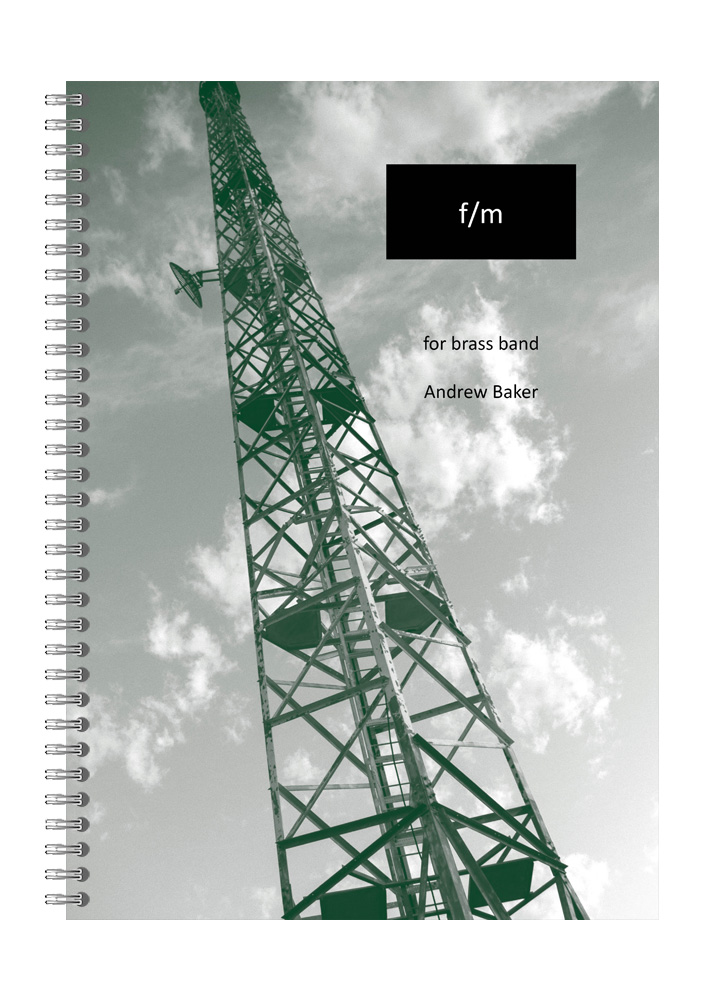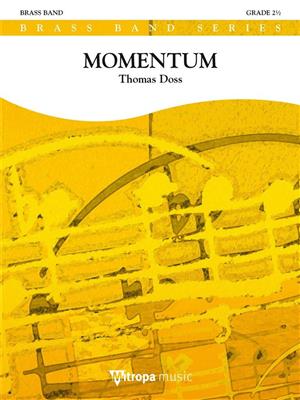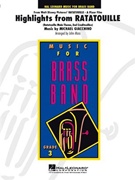Results
-
 £66.60
£66.60 -
 £44.60
£44.60 -
 £43.20
£43.20HAWAII FIVE - 0 (Brass Band) - Stevens, Morton - Ratnik, Peter
Medium/Easy
Estimated dispatch 7-14 working days
-
 £45.00
£45.00f/m
Descriptionf/m was inspired by the internet cartoon 'frequency' by the artist Randall Munroe, which can be seen atxkcd.'Frequency' displays a grid of randomly chosen statistical events which flash at the frequency of their real-time occurrence; an outwardly banal idea with surprisingly profound results. f/m (which - predictably - is short for frequency/modulation) takes a similarly random set of time/duration statistics and uses them to generate the note lengths for each instrument. The first four statistics (and the first brass instrument entries) are derived from physical science. The next eight are all related to the natural world. The final ten, for which the cornets are used, represent contemporary human activity. The percussion instruments maintain a "tick and chime" throughout the work. To view a PDF preview of the score click here.The statistics used are as follows, indicated by numbers in brackets in the score at the first iteration of each one:Lightning strikes the earth 100 times per secondThe first pulsar ever discovered, PSR1919+21, pulses once every 1.337 secondsThere are approximately 10 supernovae every 0.95 secondsEvery 0.6 seconds the entire solar system moves 100 miles around the galactic centreEvery 4.1 seconds a 70 kg human emits 1000 gamma rays due to naturally occurring potassiumA blue whale's heart beats once every 6.67 secondsA hedgehog's heart beats 300/min or 5 times a secondEvery 2 seconds the net population of the world increases by 5There is one birth every 0.24 secondsThere is one death 0.56 seconds5.14 people die of malaria every minute ( one every 11.67 seconds)10 kilotonnes of polar ice are lost on average every 1.4 seconds.Walmart's takes in sales revenue of $10,000 every 1.4 secondsEvery 3 seconds there are 60,000 plastic bags used in US supermarketsEvery 0.72 seconds the world uses 500 tonnes of paperEvery 7.65 seconds, South Korea builds a carEvery 1.75 seconds, China builds a carEvery 5.8 seconds, Germany builds a carEvery 4.7 seconds, the USA builds a truckTwo commercial airline flights take off every 1.86 secondsMacdonalds serves 300 burgers every 4 seconds and feeds 787 people per secondStarbucks uses 3 gallons of milk every secondPerformance Notes:All entries are cued by the conductor at his/her discretion. There is no specified minimum or maximum time between entries and no specified overall duration; the times between each new entry do not have to be consistent unless the conductor wishes them to be so. However each player should be allowed time to complete at least one iteration of their note, and preferably to become comfortable with their place in the overall texture - one of the aims of the work is try present dissonant sounds through the medium of the brass band outside the normal performance context, allowing players to find their place in a non-diatonic harmonic matrix without regard for linear motion or developmental activity. Entries should not coincide unless they align vertically on the score. While it is accepted that absolute accuracy is not possible, players should attempt to get as close as they can the the printed duration of their note, and do their best to keep that duration consistent during repetitions. Rests are indicated by empty staves. A continuous line indicates a repetition in progress.Soprano cornet will require a harmon mute. Cornet 1 and Trombone 2 require metal straight mutes. Cornets 5,7,8 and 9 require cup mutes. The work requires three percussionists, playing tubular bells, vibraphone and and egg shaker.Approximate duration 6'00" - 9'00"
Estimated dispatch 7-14 working days
-
 £68.99
£68.99 -
 £168.50
£168.50Music of the Spheres - Philip Sparke
Music of the Spheres was commissioned by the Yorkshire Building Society Band and first performed by them at the European Brass Band Championships in Glasgow, May 2004.The piece reflects the composers fascination with the origins of the universe and deep space in general. The title comes from a theory, formulated by Pythagoras, that the cosmos was ruled by the same laws he had discovered that govern the ratios of note frequencies of the musical scale. ('Harmonia' in Ancient Greek, which means scale or tuning rather than harmony - Greek music was monophonic). He also believed that these ratios corresponded to the distances of the sixknown planets from the sun and thatthe planets each produced a musical note which combined to weave a continuous heavenly melody (which, unfortunately, we humans cannot hear). In this work, these six notes form the basis of the sections Music of the Spheres and Harmonia.The pieces opens with a horn solo called t = 0, a name given by some scientists to the moment of the Big Bangwhen time and space were created, and this is followed by a depiction of the Big Bangitself, as the entire universe bursts out from a single point. A slower section follows called The Lonely Planet which is a meditation on the incredible and unlikely set of circumstances which led to the creation of the Earth as a planet that can support life, and the constant search for other civilizations elsewhere in the universe. Asteroids and Shooting Stars depicts both the benign and dangerous objects that are flying through space and which constantly threaten our planet, and the piece ends with The Unknown, leaving in question whether our continually expanding exploration of the universe will eventually lead to enlightenment or destruction.
Estimated dispatch 5-14 working days
-
 £168.50
£168.50Music of the Spheres (Brass Band - Score and Parts) - Sparke, Philip
Music of the Spheres was commissioned by the Yorkshire Building Society Band and first performed by them at the European Brass Band Championships in Glasgow, May 2004. The piece reflects the composers fascination with the origins of the universe and deep space in general. The title comes from a theory, formulated by Pythagoras, that the cosmos was ruled by the same laws he had discovered that govern the ratios of note frequencies of the musical scale. ('Harmonia' in Ancient Greek, which means scale or tuning rather than harmony - Greek music was monophonic). He also believed that these ratios corresponded to the distances of the six known planets from the sun and thatthe planets each produced a musical note which combined to weave a continuous heavenly melody (which, unfortunately, we humans cannot hear). In this work, these six notes form the basis of the sections Music of the Spheres and Harmonia. The pieces opens with a horn solo called t = 0, a name given by some scientists to the moment of the Big Bang when time and space were created, and this is followed by a depiction of the Big Bang itself, as the entire universe bursts out from a single point. A slower section follows called The Lonely Planet which is a meditation on the incredible and unlikely set of circumstances which led to the creation of the Earth as a planet that can support life, and the constant search for other civilisations elsewhere in the universe. Asteroids and Shooting Stars depicts both the benign and dangerous objects that are flying through space and which constantly threaten our planet, and the piece ends with The Unknown, leaving in question whether our continually expanding exploration of the universe will eventually lead to enlightenment or destruction.Duration: 18:00
Estimated dispatch 7-14 working days
-
 £53.50
£53.50Spectroduction (Brass Band - Score and Parts) - Nijs, Johan
Duration: 0.50
Estimated dispatch 7-14 working days
-
 £69.99
£69.99RATAOUILLE (Highlights) (Brass Band)
Heres the latest blockbuster animated movie from the geniuses at Disney and Pixar. With music by Michael Giacchino (The Incredibles), this entertaining and action-packed medley for Brass Band is sure to be an audience favourite. Grade: Intermediate Duration: 6:0
Estimated dispatch 7-14 working days
-
 £164.99
£164.99Music of the Spheres (Brass Band - Score and Parts)
Music of the Spheres was commissioned by the Yorkshire Building Society Band and first performed by them at the European Brass Band Championships in Glasgow, May 2004. The piece reflects the composers fascination with the origins of the universe and deep space in general. The title comes from a theory, formulated by Pythagoras, that the cosmos was ruled by the same laws he had discovered that govern the ratios of note frequencies of the musical scale. ('Harmonia' in Ancient Greek, which means scale or tuning rather than harmony - Greek music was monophonic). He also believed that these ratios corresponded to the distances of the six known planets from the sun and thatthe planets each produced a musical note which combined to weave a continuous heavenly melody (which, unfortunately, we humans cannot hear). In this work, these six notes form the basis of the sections Music of the Spheres and Harmonia. The pieces opens with a horn solo called t = 0, a name given by some scientists to the moment of the Big Bang when time and space were created, and this is followed by a depiction of the Big Bang itself, as the entire universe bursts out from a single point. A slower section follows called The Lonely Planet which is a meditation on the incredible and unlikely set of circumstances which led to the creation of the Earth as a planet that can support life, and the constant search for other civilisations elsewhere in the universe. Asteroids and Shooting Stars depicts both the benign and dangerous objects that are flying through space and which constantly threaten our planet, and the piece ends with The Unknown, leaving in question whether our continually expanding exploration of the universe will eventually lead to enlightenment or destruction.Duration: 18:00
Estimated dispatch 7-14 working days
